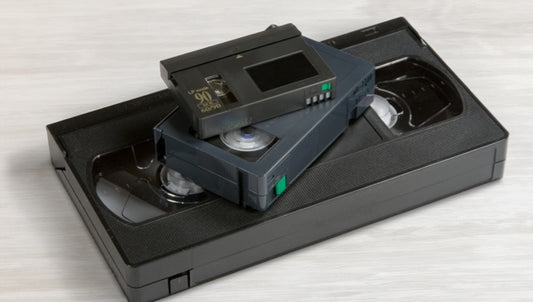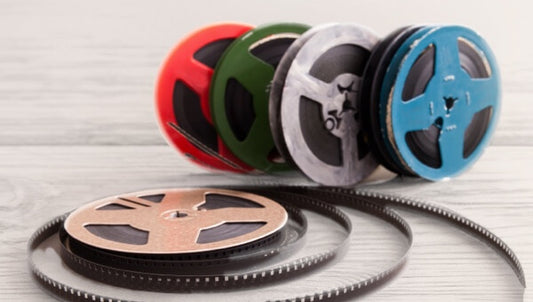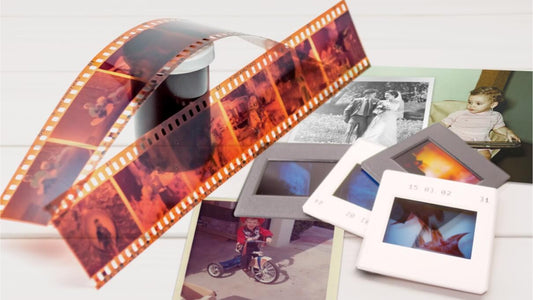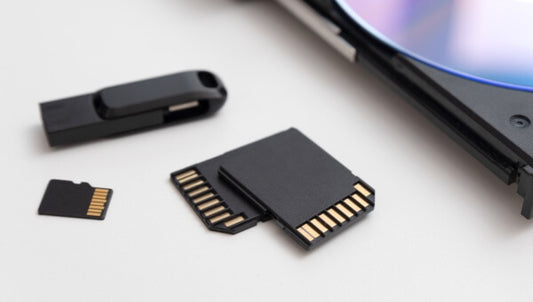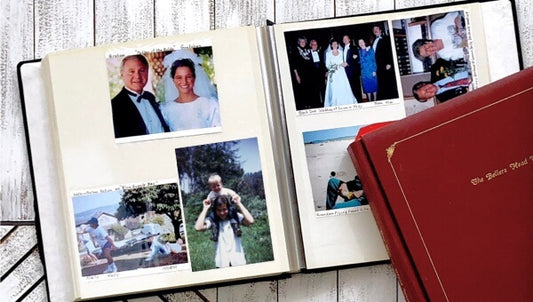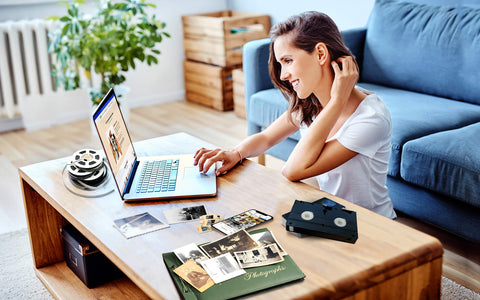Audio cassettes were a great way to listen to your favorite music albums while driving around in 80s cars or walking around with a Sony Walkman. You might have also used them to record conversations, send voice recordings to loved ones on the other side of the country or world, or to capture other audio memories.
To ensure those memories aren’t lost as audio cassettes get older and start to lose their data, Capture used 20+ years of digitization experience to put together this article on how to convert cassette to digital.
Keep reading to learn the benefits of converting to digital, what you need for cassette to digital conversion, the different methods you can use to create digital copies, and a step-by-step guide to preserving your audio memories.
Jump to:
- Why Convert Cassettes to Digital
- Gathering the Necessary Equipment
- Preparing Cassettes for Conversion
- Choosing the Right Digital Conversion Method
- Step-by-Step Conversion Process
- Enhancing Audio Quality
- Organizing and Storing Digital Files
- Preservation and Future-Proofing
Why Convert Cassettes to Digital

When 8-tracks came out, it made it possible to control what you listened to on the go, but audio cassettes replaced the format relatively quickly. Then, audio cassettes were largely replaced by CDs, which have also been replaced by other downloadable digital formats.
Because of how cassette tapes work, they only last around 30 years, which puts all the audio at risk of being lost forever. Digitizing allows you to keep the same audio content that’s stored on your audio cassettes while updating it for the new digital age.
This makes it easier to preserve it as digital files that you can store on a hard drive, thumb drive, or in the cloud. This saves tons of space because even though analog cassettes are quite small, they still take up more space than digital audio.
Plus, not many people have cassette players anymore, so it makes it much easier to listen on your computer, smartphone, Bluetooth device, or online. Then, you can share the audio files over social media and email, edit them for the best quality and functionality, and ensure that it’s not lost forever.
That means better audio quality and more possibilities for listening, sharing, uploading, or doing anything else to maximize your experience with your old analog memories. So, how do you convert cassette tape to digital?
Gathering the Necessary Equipment

Whether you want to convert cassettes to CD, Mp3, WAV, or other digital formats, it’s best to start by gathering the equipment required for the process. Some equipment will only be required for some methods, but the most basic equipment you’ll need are cassette tapes, a cassette deck of some sort to read the analog files, and a digital device whether that’s a CD, USB flash drive, or a computer.
The type of cassette deck depends on the method you choose. The easiest method is to use a designated USB cassette recorder or cassette to Mp3 converter. These machines are designed to read files and store them on a USB device.
Some brands known for quality devices include DIGITNOW!, Reshow, and ClearClick, but you can find cheaper audio capture cards if you aren’t too worried about poor sound quality or a time-consuming process. Some of the best digital converters work for VHS, Betamax, and other videotape formats as well as audio cassettes.
Another DIY option uses a standard cassette player that you plug into your computer using RCA to 3.5mm cables. This is slightly more complex, and you’ll have to buy a separate cable, but it can be much cheaper than using a cassette converter tape deck.
Finally, if you have a dual cassette and CD player/recorder, then you can use that to transfer the cassette files onto a blank CD. This is the fastest way, especially if you already have a dual CD and tape deck, but it also requires an extra step and CD ripping software to create true digital files.
Preparing Cassettes for Conversion
Before you begin transferring cassettes to digital, it’s smart to make sure they are clean, in good condition, and don’t have any tangled or broken portions. This will ensure optimal playback and the highest possible quality results.
To clean cassette tapes, you can use 90% Isopropyl alcohol and a Q-Tip to clean the magnetic tape. Clean the exposed portion, wind all the way to the beginning using a pencil in the spool, and then carefully clean each portion while winding it to the other end.
You can also buy replacement cassette boxes if yours is cracked or otherwise damaged. For tangled or broken sections, you can remove the affected area and then splice the ends together. Scotch tape can work for this, or you can buy specific splicing material.
Choosing the Right Digital Conversion Method

When choosing a digital conversion method, there are some things you should keep in mind. Some of these pros and cons we already mentioned when discussing the equipment you’ll need to digitize cassettes.
While cassette to digital converters are somewhat expensive, they make the entire process easier than doing it on your own. You can usually find them on Amazon for around $30 to $150.
However, the quality can also range significantly from the best and most expensive options and the cheapest, so if you choose this method you want to read reviews, check reputation, and find the best balance of budget and quality.
The other straight-to-digital option is to use a standard cassette player. If you already have one, then all you will need is the cable and a computer. This makes it much cheaper, and the quality can be okay, but likely not as good as the first method. However, if you get some audio editing software you can improve the quality after you convert cassette to digital.
Finally, you have the most expensive option, but one that makes a great gift for grandpa, grandma, dad, mom, or other loved ones: use one of the best digitization companies. Not all digitization companies offer audio cassette transfer, but some of the ones that do include LegacyBox, ScanCafe, and Southtree.
While this can be expensive and could take as long as 12 or more weeks to get your digital files and original cassettes back, the results can be high quality. Plus, it means that you don’t have to spend the time doing it yourself. Just make sure you read the Southtree, ScanCafe, or LegacyBox reviews before choosing one.
If you want the best results, but don’t want to spend so much money on a professional cassette digitization service, then read the next section for step-by-step instructions for cassette to MP3 conversion or digitization.
Step-by-Step Conversion Process

These are the steps to transfer audio cassettes straight to digital using the two best DIY options. If you want to convert cassette to CD, check out our dedicated article on that process!
Method 1: Digital Converter
What you need:
- Cassette tapes
- Cassette converter
- USB flash drive
- Computer
1. After you prepare and clean your cassette tapes, you will follow the specific steps for your converter. Most of them are pretty much the same, which means you start by inserting the audio cassette tape into the analog tape player and converter.
Then, depending on if you have a USB or direct-to-computer type, you’ll need to insert the USB drive or attach the audio output adapters to your computer.
2. Rewind the cassette to the very beginning. Then, press the audio recorder button that converts the old tapes and puts the files on the USB or hard drive. This will be done at normal playback speed.
3. Once the first side is complete, hit the stop button and remove the cassette. Flip it over and repeat step 2.
4. After both sides have been transferred, stop the machine, rewind the tape, and remove the cassette and the USB flash drive.
5. If you used a USB type, the flash drive will contain the Mp3 files (or other file types depending on the converter you choose). Put it into your Mac or Windows computer to transfer the files to the hard drive or cloud storage.
Method 2: Standard
What you need:
- Cassette player
- Audio output cables (3.5 microphone input like an RCA to 3.5mm or 3.5mm male-to-male adapter depending on your cassette player).
- Computer with microphone output (otherwise you’ll need to use method 1)
- Audacity or other audio software
1. Clean the audio tapes and then connect the cassette deck to the computer with the audio output cable that fits both devices. It will typically go into the headphone jack, but it depends on the specific tape player.
2. Open audio software and choose the audio input type of drive. This will be shown as a microphone symbol or as the file drive that you plugged into.
3. Test the volume by playing the cassette audio and adjusting it on the deck until it sounds good and isn’t distorted. Many audio software and editing tools will show green to tell you it’s correct.
4. Rewind the cassette to the start.
5. Then, hit record for real-time transfer.
6. At the end of the first side, flip the tape and repeat step 5.
Enhancing Audio Quality

The most important factors for good audio quality during the process include the right volume level, clean tapes, high quality adapters and cables, and a clean and premium quality tape player.
In addition, you can use sound editing software to improve the conversion or edit the digital files after conversion. This can allow you to reduce background white noise, adjust treble and bass, equalize the audio, and much more to ensure the highest possible quality for your digitized audio files.
You can even split and combine specific audio tracks to create new sounds, mixtapes, and creative experiments. If you want, you can learn how to scrapbook digitally and then add audio to your digital pages.
Additionally, the least number of transfers the better. That’s why the sound quality might be lower if you convert to CD or USB before converting into Mp3 or WAV format. Instead, try to find an option with the least number of steps to convert cassette to digital, if possible.
Organizing and Storing Digital Files
Once you have digital files, it’s important to organize them so that they are easier to find and will not be lost if your computer breaks. We recommend storing them either in the cloud or within two different devices. That way, if one device breaks down, you still have the files.
Like with organizing photos, VHS tapes, or other media, you want to organize your audio files in a way that you know how to find what you’re looking for. This could be alphabetically, topically, by band or loved one, chronologically, or any other number of organization techniques.
Then, you can name the files and folders accordingly for an organized collection of your digitized cassettes. You can also add meta data to make it easier to search and find your specific audio tracks.
Preservation and Future-Proofing

When you digitize cassette tapes, you preserve them forever, but like CDs vs DVDs or the evolution of the camera from film to digital, formats will keep changing in the future. To ensure your files keep up with the times, make sure you store them properly on multiple devices or using cloud storage.
Then, as new formats come along or you get new devices, make sure you transfer them to the newest devices. You can also convert them into the newest multimedia formats or upload them to online sharing sites to keep them preserved, up-to-date, and of the highest possible quality.
Conclusion
Now that you know how to convert cassette to digital, you can preserve your memories, mixtapes, music files, and analog audio. You can still keep the old cassettes, but as they wear out and degrade you will still have the audio preserved as digital copies. Whether you choose to use a standard tape player or a digital converter, you’ll be able to save and pass down your audio memories to future generations.
If you have other retro formats like VHS tapes, film reels, or old photos, Capture offers expertise and friendly service to convert them to digital format. Click here to learn about our state-of-the-art equipment, professional process, and what makes us the best choice for your most precious memories!





